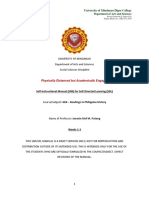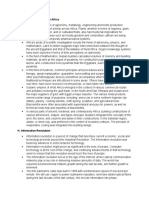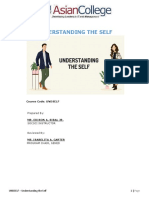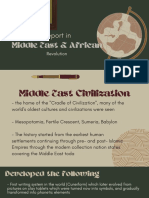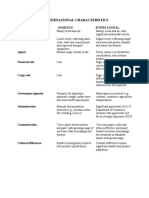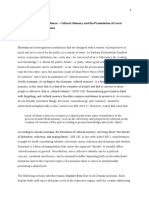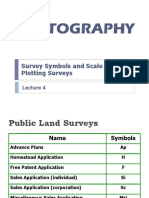Professional Documents
Culture Documents
Asian Civilization African Civilization Western Civilization
Asian Civilization African Civilization Western Civilization
Uploaded by
Diana Rose PaceloOriginal Description:
Original Title
Copyright
Available Formats
Share this document
Did you find this document useful?
Is this content inappropriate?
Report this DocumentCopyright:
Available Formats
Asian Civilization African Civilization Western Civilization
Asian Civilization African Civilization Western Civilization
Uploaded by
Diana Rose PaceloCopyright:
Available Formats
Asian Civilization
African Civilization
Western Civilization
Asia is the birthplace of the world’s three ancient China, ancient India, and
Babylon.
Each gave the world different architectural styles and global landmarks such Great
wall of China, Taj Mahal, Angkor Wat and Burj Khalifa Tower.
Asia is not only the most populous continent but also the cradle the world’s oldest
civilizations.
It has played a leading role in the history of human development.
The complex natural and geographical environment and diverse cultures and
customs of Asia have given birth to a variety of distinctive regional civilizations
over its thousands-year-long history.
Asia is the world’s most populated continent with the greatest diversity of culture.
Asian culture is colorful and immensely interesting. It is a result of the continent’s
long history.
Different ancient civilizations have passed down their traditions and practices to
their descendants.
With the goal of common development and prosperity, Asian civilizations embrace,
learn from and respect one another, leading to the flourishing of individual
civilizations as well as the emergence of a "community with shared future for
mankind" where countries come together and unite.
Africa is blessed with natural and mineral resources.
Science also emerged in this part of the planet long before the Europeans
colonized it.
Four major areas of civilization emerged in early Africa: the grasslands south of
the Sahara, western Africa, the northern desert regions, and eastern Africa.
Each area was unique, but the regions became more interconnected as a result of
two major developments: the domestication of the camel and the arrival of Islam in
Africa.
The camel facilitated trade over long distances, including the vast Sahara Desert,
while Islam connected Africa more closely to cultures and trade systems in the
Mediterranean and the Middle East.
The leading civilizations of this African rebirth were the Axum Empire,
the Kingdom of Ghana, the Mali Empire, the Songhai Empire, the Ethiopian
Empire, the Mossi Kingdoms and the Benin Empire.
Second-largest continent (after Asia), straddling the equator and lying largely
within the tropics. Africa's first great civilization emerged in ancient Egypt in
c.3400 BC. Carthage was founded by Phoenicians in the 9th century BC.
The ancient Egyptian civilization has contributed immensely and made significant
advances in the field of the astronomy, mathematics, and medicine alongside other
technologies.
It refers broadly to a constellation of beliefs, political systems, and events rooted
in European history and Western culture.
Greek civilization known as the birthplace of Western philosophy.
What one can say with confidence is that Western civilization has had a massive
influence across the globe, in all domains of life.
Similarities
They have their own origins.
They have their own cultures, beliefs, architectural structures, landmaks, and
religions.
They have their own native languages.
They have a culture of ancestor worship and have respect for elders.
They share a colonial heritage and duality of language; local and colonial.
Both share a belief in superstitious; ghost, black magic.
Rice is central to the cuisine.
They have their own inventions,
You might also like
- Mapeh Siklaban ProposalDocument3 pagesMapeh Siklaban ProposalAlvin Mas Mandapat75% (4)
- Constitutional Law II PDFDocument40 pagesConstitutional Law II PDFSagar Balu100% (1)
- OM ReportDocument11 pagesOM ReportknavstragetyNoch keine Bewertungen
- CH 3 STS Philippine HistoryDocument48 pagesCH 3 STS Philippine HistoryCogie PeraltaNoch keine Bewertungen
- Lesson 2 StsDocument41 pagesLesson 2 StsMark Jamil BariNoch keine Bewertungen
- Science, Technology and Society in The 20 Century: Lesson 10Document18 pagesScience, Technology and Society in The 20 Century: Lesson 10Ramses MalalayNoch keine Bewertungen
- Chapter 3 - Historical Antecedents in The Course of Science and Technology (Medieval and Modern Civilizations Philippine Inventions)Document4 pagesChapter 3 - Historical Antecedents in The Course of Science and Technology (Medieval and Modern Civilizations Philippine Inventions)Aira Joy AnyayahanNoch keine Bewertungen
- Folk Arts From Southern Tagalog and Bicol Region: Lesson 3Document3 pagesFolk Arts From Southern Tagalog and Bicol Region: Lesson 3Kris Mitchel AlboloteNoch keine Bewertungen
- Lesson 3: The Contribution of Greek, Persian and Romans in The Development of Science and TechnologyDocument5 pagesLesson 3: The Contribution of Greek, Persian and Romans in The Development of Science and TechnologyChristian Jay CusayNoch keine Bewertungen
- AbraDocument18 pagesAbraObed Andalis0% (1)
- Development of Science in Africa - CoverageDocument2 pagesDevelopment of Science in Africa - CoverageJose JeramieNoch keine Bewertungen
- GROUP 1 (N2BAM-3A) The Philippine Government Science & Technology AgendaDocument4 pagesGROUP 1 (N2BAM-3A) The Philippine Government Science & Technology AgendaBJ A. Isidro100% (1)
- Angellene GE 102 ModuleDocument77 pagesAngellene GE 102 ModuleLovely BandesNoch keine Bewertungen
- Module 1 Art AppreciationDocument4 pagesModule 1 Art AppreciationChiarra Mae DapitoNoch keine Bewertungen
- Middle Ages, Modern Times and Philippine InventionsDocument18 pagesMiddle Ages, Modern Times and Philippine InventionsJáylord OsorioNoch keine Bewertungen
- Lesson 5. Contribution of Arabs Chinese and HinduDocument7 pagesLesson 5. Contribution of Arabs Chinese and HinduJunna Marie Dioses90% (10)
- CRADLES-OF-EARLY-SCIENCE PresentationDocument97 pagesCRADLES-OF-EARLY-SCIENCE PresentationClein Dave AmilingNoch keine Bewertungen
- Everything About KalingaDocument5 pagesEverything About Kalingashane anneNoch keine Bewertungen
- Science Technology and Its Significance To Society in Contemporary WorldDocument11 pagesScience Technology and Its Significance To Society in Contemporary Worldreggie firmanesNoch keine Bewertungen
- Unit 1: Embracing The HumanitiesDocument35 pagesUnit 1: Embracing The HumanitiesLovely Joy Benavidez BarlaanNoch keine Bewertungen
- Cordillera Administrative RegionDocument28 pagesCordillera Administrative RegionKirsten FernandoNoch keine Bewertungen
- STS Act 4Document5 pagesSTS Act 4Nica Hannah50% (2)
- Module - STS - Lecture Notes 1-6 Module - STS - Lecture Notes 1-6Document27 pagesModule - STS - Lecture Notes 1-6 Module - STS - Lecture Notes 1-6Magsino, Jubillee SantosNoch keine Bewertungen
- 1300-A.D 1550 in The Western World)Document2 pages1300-A.D 1550 in The Western World)Junna Marie DiosesNoch keine Bewertungen
- Development of Science in MesoamericaDocument2 pagesDevelopment of Science in MesoamericaChristine Payopay0% (1)
- STS Module 2Document6 pagesSTS Module 2Kristine Joyce BesmonteNoch keine Bewertungen
- March 29, 1521 (Holy Friday) : The CaptainDocument4 pagesMarch 29, 1521 (Holy Friday) : The Captainkairos sunsetNoch keine Bewertungen
- Information Age TimelineDocument8 pagesInformation Age TimelineZPads0% (1)
- A History of Science and Technology in The PhilippinesDocument29 pagesA History of Science and Technology in The PhilippinesVillaran, Jansamuel F.Noch keine Bewertungen
- Understanding The SelfDocument12 pagesUnderstanding The Selflorna50% (4)
- Diego Silang RevoltDocument6 pagesDiego Silang RevoltFobe Lpt NudaloNoch keine Bewertungen
- Physically Distanced But Academically Engaged: Self-Instructional Manual (SIM) For Self-Directed Learning (SDL)Document19 pagesPhysically Distanced But Academically Engaged: Self-Instructional Manual (SIM) For Self-Directed Learning (SDL)Jean Rose Tabagay Bustamante100% (1)
- Primary and Secondary SourcesDocument8 pagesPrimary and Secondary SourcesJoshua Jae AquinoNoch keine Bewertungen
- Region 11 (Davao Region)Document6 pagesRegion 11 (Davao Region)Simplicio Gadugdug VNoch keine Bewertungen
- Information Revolution: Villajin, Nikki Loren C. Mañalac, Kurt Russel PDocument12 pagesInformation Revolution: Villajin, Nikki Loren C. Mañalac, Kurt Russel PKurtNoch keine Bewertungen
- Anino, Bonono, Yunzal Math100 Midterm M2 L1 For UploadingDocument18 pagesAnino, Bonono, Yunzal Math100 Midterm M2 L1 For UploadingPhilip CabaribanNoch keine Bewertungen
- Lesson No. 2 Ancient, Middle and Modern AgesDocument19 pagesLesson No. 2 Ancient, Middle and Modern AgesMerryl IbañezNoch keine Bewertungen
- Local & Oral History: Preliminary InformationDocument4 pagesLocal & Oral History: Preliminary InformationJohn Clemente100% (1)
- Unit 2 - LESSON 4-10 (STS)Document12 pagesUnit 2 - LESSON 4-10 (STS)Angilyn LumabasNoch keine Bewertungen
- RizalDocument1 pageRizalAudzkieNoch keine Bewertungen
- Science Technology and Nation BuildingDocument4 pagesScience Technology and Nation BuildingCholophrex SamilinNoch keine Bewertungen
- Intellectual Revolutions:: Copernican, Darwinian, FreudianDocument21 pagesIntellectual Revolutions:: Copernican, Darwinian, FreudianDigna Tabonda100% (1)
- Lesson 1 (Final) - Module in Contemporary WorldDocument16 pagesLesson 1 (Final) - Module in Contemporary WorldLord Ivan PanchoNoch keine Bewertungen
- STS Serafica ReviewerDocument5 pagesSTS Serafica ReviewerKenken JavierNoch keine Bewertungen
- Hum 102Document9 pagesHum 102Franny BooyNoch keine Bewertungen
- Contributions of Filipino ScientistDocument2 pagesContributions of Filipino ScientistJonathan M. AbelleraNoch keine Bewertungen
- How Can Science Influence Government Policies?Document1 pageHow Can Science Influence Government Policies?Joenard Sadorra CabaelNoch keine Bewertungen
- STS - Chapter 4 SummaryDocument6 pagesSTS - Chapter 4 SummaryKae Abegail GarciaNoch keine Bewertungen
- Meso-American StsDocument20 pagesMeso-American StsNemia Kathe G. BarbosaNoch keine Bewertungen
- G. Scientific Revolution in AfricaDocument2 pagesG. Scientific Revolution in AfricaJohnlloyd BarretoNoch keine Bewertungen
- Asian Scientific Revolution ReportDocument3 pagesAsian Scientific Revolution ReportAyra Mae DesepedaNoch keine Bewertungen
- Understanding The Self: Course Code: UNDSELFDocument17 pagesUnderstanding The Self: Course Code: UNDSELFDianna Rose DiazNoch keine Bewertungen
- Module 1 Assignment 1 Meaning of HistoryDocument3 pagesModule 1 Assignment 1 Meaning of HistoryNoemiAlodiaMoralesNoch keine Bewertungen
- Biography of Prominent Filipino FiguresDocument3 pagesBiography of Prominent Filipino Figuresjovani capizNoch keine Bewertungen
- Science, Technology and Society in The Middle AgesDocument40 pagesScience, Technology and Society in The Middle AgesbjihuhNoch keine Bewertungen
- Science and Technology in The PhilippinesDocument42 pagesScience and Technology in The PhilippinesJoyNoch keine Bewertungen
- Information Age Science Technology and SocietyDocument20 pagesInformation Age Science Technology and SocietyAngelie Jalandoni100% (1)
- ZaideDocument4 pagesZaideLeo TabulongNoch keine Bewertungen
- Lesson 7 Art in Early Civilizations & Lesson 8 Art in Emerging Europe PDFDocument16 pagesLesson 7 Art in Early Civilizations & Lesson 8 Art in Emerging Europe PDFKate AlbesNoch keine Bewertungen
- Activity 9: Types of Art ExpressionDocument2 pagesActivity 9: Types of Art ExpressionDesireeNoch keine Bewertungen
- Science, Technology As A Way of RevealingDocument6 pagesScience, Technology As A Way of RevealingJonas Boadilla100% (1)
- The State Of: Science and Technology During The Middle Ages (A.D. 400-A.D. 1300 in The Western World)Document28 pagesThe State Of: Science and Technology During The Middle Ages (A.D. 400-A.D. 1300 in The Western World)Emgelle Jalbuena100% (1)
- Report In: Middle East & AfricanDocument9 pagesReport In: Middle East & African12 ABM A- ABAD, GLIZZLENoch keine Bewertungen
- Consumer HealthDocument29 pagesConsumer HealthDiana Rose PaceloNoch keine Bewertungen
- Understanding FertilityDocument14 pagesUnderstanding FertilityDiana Rose PaceloNoch keine Bewertungen
- Eight Basic Rights of A ConsumerDocument1 pageEight Basic Rights of A ConsumerDiana Rose PaceloNoch keine Bewertungen
- Communicating - With My AdolescentsDocument21 pagesCommunicating - With My AdolescentsDiana Rose PaceloNoch keine Bewertungen
- Class Management TechniquesDocument25 pagesClass Management TechniquesDiana Rose PaceloNoch keine Bewertungen
- Grade 10 Ruby List of NamesDocument3 pagesGrade 10 Ruby List of NamesDiana Rose PaceloNoch keine Bewertungen
- Rediscovering The Journey of AdolescenceDocument25 pagesRediscovering The Journey of AdolescenceDiana Rose PaceloNoch keine Bewertungen
- Internship Narrative Report 2Document58 pagesInternship Narrative Report 2Diana Rose PaceloNoch keine Bewertungen
- Weekly Monitoring ReportDocument12 pagesWeekly Monitoring ReportDiana Rose PaceloNoch keine Bewertungen
- Assessment II. Essay. Below The Statements About 20Document8 pagesAssessment II. Essay. Below The Statements About 20Diana Rose PaceloNoch keine Bewertungen
- American Football EquipmentsDocument3 pagesAmerican Football EquipmentsDiana Rose PaceloNoch keine Bewertungen
- Calq/ Iloi - ) : Commission On AuditDocument10 pagesCalq/ Iloi - ) : Commission On AuditDiana Rose PaceloNoch keine Bewertungen
- Labour Law Alt. Assessment - Raunaq KwatraDocument3 pagesLabour Law Alt. Assessment - Raunaq KwatraPravir MalhotraNoch keine Bewertungen
- Domestic Vs Global Supply ChainDocument2 pagesDomestic Vs Global Supply Chainharsh saini100% (1)
- Management Practices ThesisDocument28 pagesManagement Practices Thesiskris dotillos100% (5)
- Cases in Transpo 5Document154 pagesCases in Transpo 5Angelique Giselle CanaresNoch keine Bewertungen
- Infographic ExplanationDocument5 pagesInfographic ExplanationEricIswanNoch keine Bewertungen
- EMGT 807 Fall A 23 SyllabusDocument6 pagesEMGT 807 Fall A 23 Syllabus3EME INGENIERIANoch keine Bewertungen
- From Michoud To The MoonDocument12 pagesFrom Michoud To The MoonBob Andrepont100% (3)
- Cases in Crim 2.2Document8 pagesCases in Crim 2.2jobelle barcellanoNoch keine Bewertungen
- As 5808-2009 Child-Resistant Packaging - Requirements and Testing Procedures For Non-Reclosable Packages ForDocument10 pagesAs 5808-2009 Child-Resistant Packaging - Requirements and Testing Procedures For Non-Reclosable Packages ForSAI Global - APACNoch keine Bewertungen
- Lifebuoy PPT 2Document22 pagesLifebuoy PPT 2Ankit Maheshwari100% (1)
- 1st Test 3LDocument2 pages1st Test 3LNasma BrikNoch keine Bewertungen
- Application LetterDocument1 pageApplication LetterBless MendozaNoch keine Bewertungen
- Learners Diversity and Student InclusionDocument13 pagesLearners Diversity and Student Inclusionharold carcedoNoch keine Bewertungen
- Donald Miller Quotes (Showing 1-50 of 170)Document7 pagesDonald Miller Quotes (Showing 1-50 of 170)Wanda Montes de OcaNoch keine Bewertungen
- Pre Test in UcspDocument2 pagesPre Test in UcspMark Kevin VidarNoch keine Bewertungen
- NationDocument8 pagesNationOmar Dela CruzNoch keine Bewertungen
- Women and LawDocument18 pagesWomen and LawShailesh KumarNoch keine Bewertungen
- Chapter 10 Developing A Global Management Cadre: International Management, 9e (Deresky)Document35 pagesChapter 10 Developing A Global Management Cadre: International Management, 9e (Deresky)Christie LamNoch keine Bewertungen
- ಆರು ಹಿತವರು ನಿನಗೆDocument4 pagesಆರು ಹಿತವರು ನಿನಗೆKeke0% (1)
- Expecting An Insider Audience (767) Überarbeitet Mesenbrock KopieDocument12 pagesExpecting An Insider Audience (767) Überarbeitet Mesenbrock KopieSarah MesenbrockNoch keine Bewertungen
- Strategic Management Chapter-7Document24 pagesStrategic Management Chapter-7Towhidul HoqueNoch keine Bewertungen
- Dulpina, Emily D. - Reflection PaperDocument3 pagesDulpina, Emily D. - Reflection PaperEmily Despabiladeras DulpinaNoch keine Bewertungen
- Assets ClassificationDocument21 pagesAssets Classificationhamarshi2010Noch keine Bewertungen
- M., The Apostle and The Evangelist Vols.8-10 (610p)Document610 pagesM., The Apostle and The Evangelist Vols.8-10 (610p)jobox1Noch keine Bewertungen
- Risk Register TemplateDocument10 pagesRisk Register TemplateGovLoop - "Facebook for Government"67% (3)
- GE 103 Lecture 4Document13 pagesGE 103 Lecture 4aljonNoch keine Bewertungen
- Teen Choice Awards 2010 Winners Full ListDocument4 pagesTeen Choice Awards 2010 Winners Full ListnournicolasNoch keine Bewertungen































